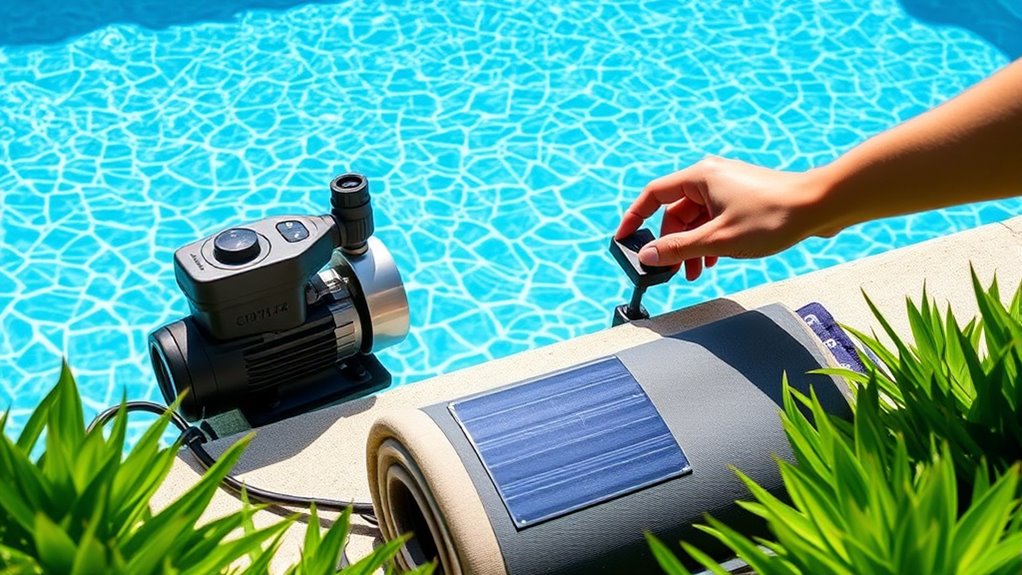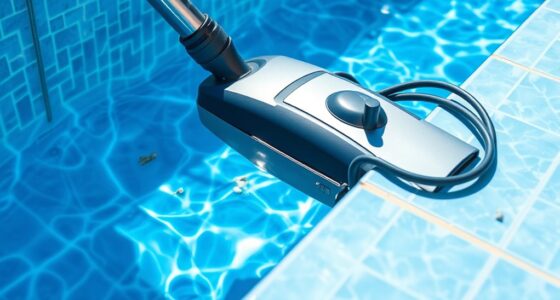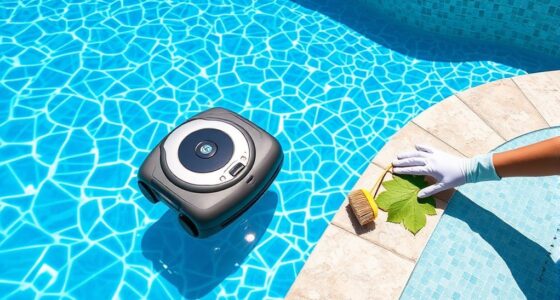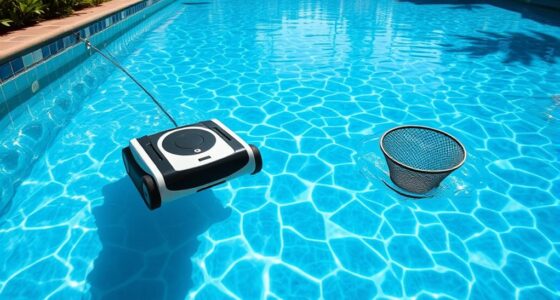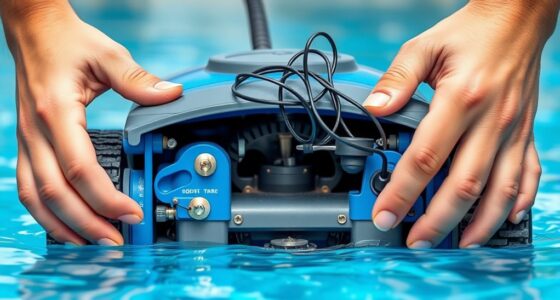To save money on pool maintenance, use solar heating to cut energy costs naturally and install energy-efficient, variable-speed pumps for better circulation. Keep your filters clean and your chemicals balanced to prevent equipment strain, and always cover your pool when not in use to reduce heat loss. Schedule filtration during off-peak hours with automation systems to avoid waste. Follow these tips, and you’ll discover even more ways to keep your pool eco-friendly and affordable.
Key Takeaways
- Use a pool cover to reduce heat loss and evaporation, lowering heating and chemical costs.
- Schedule filtration cycles during off-peak hours to benefit from lower electricity rates.
- Install energy-efficient, variable-speed pumps to optimize circulation and minimize power consumption.
- Regularly clean filters and remove debris to ensure smooth water flow and reduce strain on equipment.
- Incorporate solar heating to naturally warm the pool, decreasing reliance on electric or gas heaters.
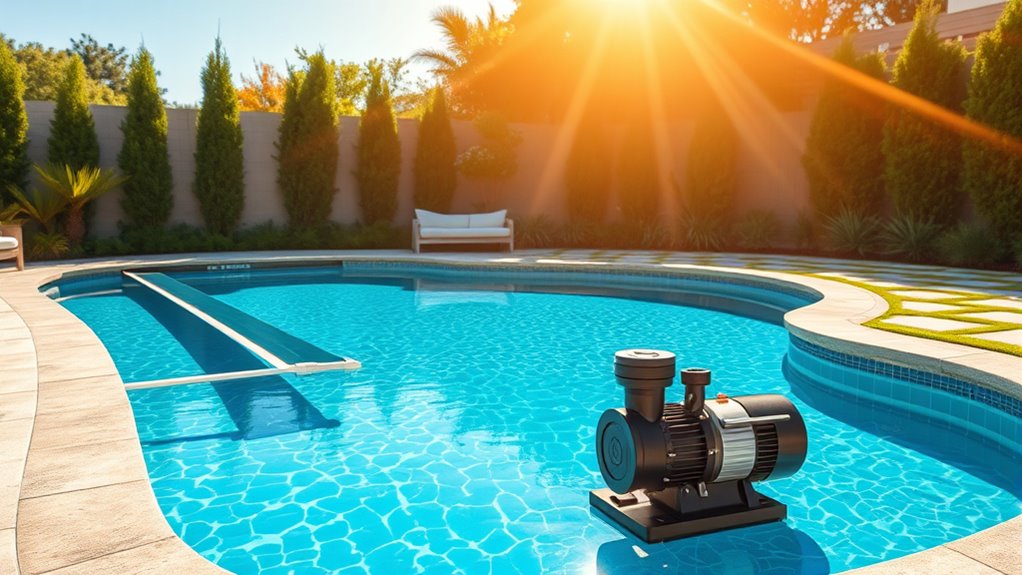
Maintaining a pool doesn’t have to drain your energy or your wallet. By making a few smart choices, you can keep your pool clean and inviting while cutting down on energy costs. One of the most effective ways to do this is by investing in solar heating. Solar pool heaters harness the sun’s free energy to warm your pool naturally, reducing reliance on traditional electric or gas heaters. Installing solar panels is straightforward, and once set up, they operate silently and require minimal maintenance. This renewable approach not only saves money on utility bills but also lessens your environmental impact, making it a win-win for both your wallet and the planet.
Invest in solar heating to save money and reduce environmental impact effortlessly.
Alongside solar heating, choosing energy-efficient pumps plays a vital role in lowering your pool’s energy consumption. Modern energy-efficient pumps are designed to operate at lower speeds while maintaining excellent circulation. Unlike older, single-speed pumps that run at full capacity regardless of need, variable-speed pumps allow you to set the flow rate based on your pool’s requirements. This adjustment can considerably reduce electricity usage, sometimes cutting your pump energy costs by up to 80%. When shopping for a pump, look for models with high-efficiency ratings and variable-speed capabilities, and ensure they are appropriately sized for your pool. Proper sizing prevents unnecessary energy waste and prolongs the lifespan of your equipment.
Regular maintenance also enhances efficiency. Keep your pool’s filter clean and clear of debris so that water flows smoothly, reducing strain on your pump. Check and adjust chemical levels regularly to prevent algae growth and keep the water balanced, which minimizes the need for excessive filtration or chemical treatments. Covering your pool when it’s not in use provides insulation, reducing heat loss and water evaporation. This simple step works hand-in-hand with solar heating by maintaining the temperature longer without additional energy input. Additionally, understanding the importance of energy-efficient pool components can help you make better choices for long-term savings.
Finally, consider scheduling your pool’s filtration cycles during off-peak hours. Electricity rates are often lower during these times, helping you save money on your energy bill. Automating your pool system with timers and smart controls ensures that your pool runs only when necessary, avoiding wasteful operation. Combining these practices—solar heating, energy-efficient pumps, regular maintenance, and smart scheduling—can make a remarkable difference. Not only will you enjoy a clean, warm pool, but you’ll also see considerable savings on your energy costs over time. With these simple but effective strategies, maintaining your pool becomes more affordable and eco-friendly, giving you more time to relax and enjoy your backyard oasis.
Frequently Asked Questions
How Often Should I Test My Pool’S Water Chemistry?
You should test your pool’s water chemistry at least twice a week to guarantee proper chemical balance. Regular water testing frequency helps you catch imbalances early and maintain healthy water. Use test strips or a testing kit for accurate readings. Monitoring chemical balance frequently prevents issues like algae growth or corrosion. Adjust chemicals as needed, and always keep an eye on pH, chlorine, and alkalinity levels for a safe, clean pool.
What Are the Signs My Pool Needs New Equipment?
If your pool isn’t clearing up or the water’s cloudy, it might be time for new equipment. Watch for frequent filter clogs or increased energy bills, which indicate your pool filter maintenance is failing. Additionally, if your pool equipment makes unusual noises or struggles to operate, it signals it’s nearing the end of its lifespan. Replacing outdated equipment guarantees better efficiency and keeps your pool sparkling all season.
Can Solar Covers Really Save Energy and Reduce Costs?
Imagine a shield of sunlight wrapping your pool in warmth—solar covers do just that, harnessing the sun’s energy to keep your water warm and reduce evaporation. By using solar covers, you can markedly boost energy savings, lowering your heating costs and easing the burden on your pool’s filtration system. Yes, they really save energy and cut costs, making your pool more eco-friendly and budget-friendly all season long.
How Can I Prevent Algae Growth Efficiently?
You can prevent algae growth efficiently by maintaining proper chlorine balance in your pool; this helps keep algae at bay. Regularly test and adjust your chlorine levels to ensure they’re neither too high nor too low. Additionally, using algaecides as a preventive measure, cleaning your pool regularly, and brushing the surfaces can disrupt algae growth. Consistent maintenance and monitoring are key to algae prevention and keeping your pool clear.
Are Energy-Efficient Pumps Suitable for Large Pools?
You might wonder if energy-efficient pumps are suitable for large pools. Yes, they can be, but you need to consider your pool size and pump capacity carefully. Larger pools require pumps with higher capacity to circulate water effectively without wasting energy. Look for models designed for bigger pools, ensuring they deliver enough flow rate. This way, you save energy while maintaining ideal water quality, making your pool both eco-friendly and cost-effective.
Conclusion
By following these energy-efficient pool maintenance tips, you’ll not only save money but also keep your pool sparkling and inviting all season long. Imagine turning your backyard into an oasis without draining your wallet—your savings could be so huge, they might just outshine the sun! Staying proactive and eco-friendly guarantees your pool stays pristine while you enjoy huge energy savings. Immerse yourself in these tips today, and watch your costs shrink faster than a pool float in a hurricane!

